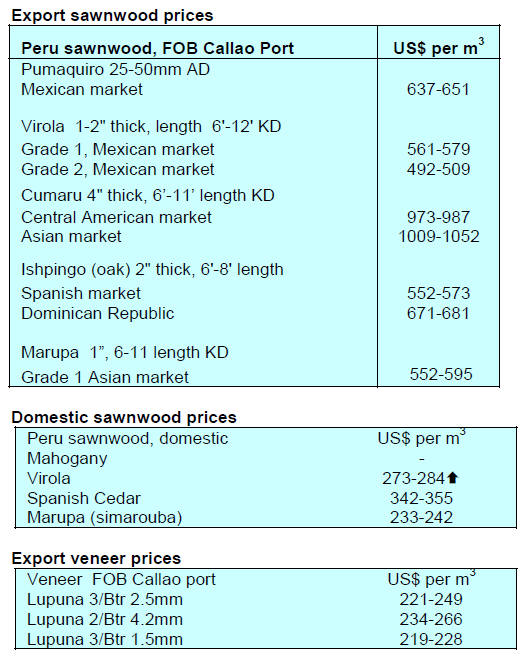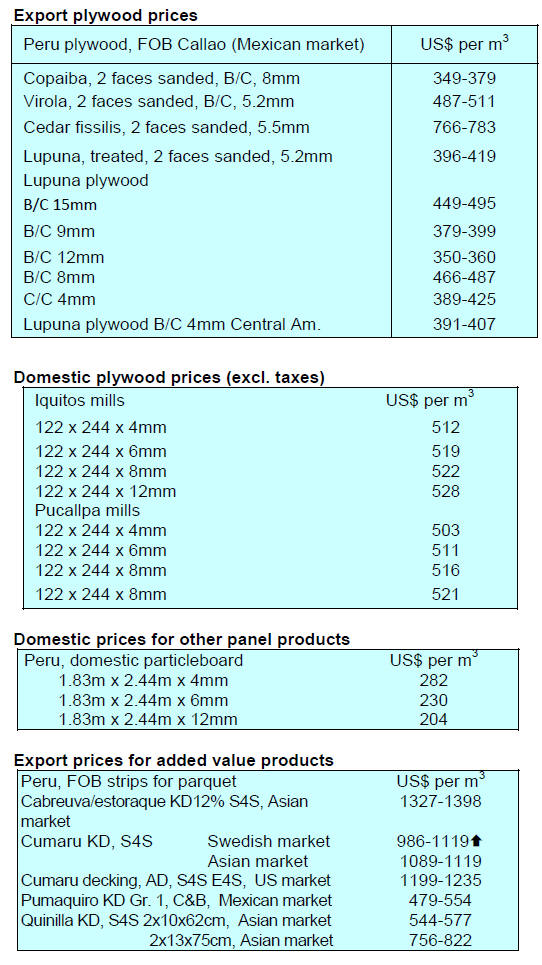4.
INDONESIA
Survey - Impact of
pandemic on timber sector
1. Are mills still operating?
Most wood industries are still operating, but they
unfortunately are decreasing production. Some factory
operations will continue for the next few months since
Indonesia has implemented a semi-lockdown in Jakarta
beginning 10 April to be followed by a lockdown in West
and East Java in the near future.
Another cause of lower production is the postponement of
orders by importers in the European Union, America and
parts of Asia. However, Indonesia's wood product exports
for the first quarter 2020 have not been seriously affected
by the pandemic. The types of products that experienced a
decline in exports were HS 470329 (Wood pulp; chemical
wood pulp) and HS 442199 (Wood; not of bamboo).
2. Have workers been laid off?
Partly, a sort of an interim lay off. Some companies apply
a shift-based work to minimise the production cost.
(HIMKI indicated that lay offs total 280,000).
3. Are laid off workers receiving payments?
They are being paid but not full payment (based on
agreement). Some companies still pay workers with full
wages, but the production target is decreased.
4. Are companies already receiving government support?
Not yet, the government is still assessing data from
impacted companies and workers affected by lay offs.
Some associations propose government support such as
relaxation/reduction of PPH tax for the companies,
reduced regulation of import and subsidy for 180,000
workers monthly wages.
5. Have orders been cancelled?
Orders from the international buyers, especially the
countries badly affected by the pandemic, have been
postponed. However, countries less affected continue to
place orders, although the export process at the port is
slightly hampered due to restrictions on working hours and
the implementation of the shift work system. This will get
worse for the next few months due to strict business and
social interaction restrictions.
6. Estimated % change in shipments since Jan 2020 to:
China, EU, US, Others
The exact figure cannot be obtained yet but exports to
China are moving but exports to Europe in countries such
as Italy stopped in February/March.
7. Are mill stock levels increasing?
Stocks of finished materials are accumulating because the
goods that are ready to be sent do not get loaded.
Estimated rise in stocks 70%.
8. How much time would be required to ramp up
production to pre-crisis levels?
Maybe more than 1 year provided the government gives
full support and provides incentives for industries related
to reduction of taxation and bank interest rates. For the
Plywood industries, it depends on market conditions, if
export destinations have reopened their markets the
industry will be ready to supply soon.
For wood working companies, If the government provides
assistance to the industry in the form of tax breaks,
simplification of export regulations, funding assistance for
co-affected workers the time needed to recover the
company's economic conditions will be fast.
9. What will be the main challenges in ramping up
production?
The main challenges for increasing the value of wood
production are: There is a decline in European and
American market demand, while customers continue to
demand delivery of goods on time when the government
implements a lock down policy.
The government needs to eliminate the technical
verification policy (LS) to reduce bureaucracy. Company
cash flow is disrupted and the government has not yet
implemented a policy of reducing/relaxing the export and
import taxes. Procurement of imported raw materials is
disrupted so relaxation of import licenses is needed.
10. Are containers still being loaded at the port?
Last month, when the lockdown was less effective
containers were still there for the destinations not affected
by the pandemic. But problems arose with trucking to a
port because forwarders were operating reduced shifts.
11. Are containers readily available?
As of April there were reports of a shortage of containers
but few were being stuffed as importers requested delayed
shipment.
280,000 furniture sector workers laid off
Abdul Sobur, Secretary General of the Indonesian
Furniture and Crafts Industry Association (HIMKI), has
reported that, in addition to the thousands of workers laidoff
in the retail, hotel, and restaurant sectors, furniture
manufacturers have indicated that they have had to lay off
some 280,000 workers.
Indonesian furniture industries are labour intensive with
around 2.1 million employed. The current crisis has meant
that furniture companies have had to make cuts in
production which has impacted labour.
The HIMKI has 3,500 member companies and there are
around 400,000 workers in the factories but as of mid-
April about 70% are laid off". One main problem is that
many export destinations are closed to shipments in others
importers have asked for delayed shipments.
Sobur has determined that large sized HIMKI member
companies may be able to retain employees for around 8
weeks but for medium and small companies they will not
be able to equal the 8 week wage payments.
Sobur urged the government to quickly disburse Direct
Cash Assistance (BLT) to employees who were laid off to
sustain their livelihood.
See:
https://kumparan.com/kumparanbisnis/industri-mebel-jugaterimbas-corona-280-000-karyawan-dirumahkan-1tBMcYEWYcN
The corona epidemic in Indonesia has had a devastating
impact on workers as many businesses in all sectors have
shut down and furloughed or laid off their employees.
Ministry of Manpower data shows that over a million
workers in about 75,000 companies in the formal and
informal sectors have either been told to stay home or
have been laid off .
Ida Fauziyah, Minister of Manpower, urged companies to
make layoffs their last choice. She said options could be
to reduce wages or reduce working days. The media
reports her as saying “The (current) situation and
conditions are indeed challenging but this is the moment
for the government, business people and workers to work
together and find a solution to mitigate the impact of
COVID-19”.
See:
https://www.thestar.com.my/news/regional/2020/04/10/indonesia-sees-12-million-workers-furloughed-laid-off-in-virus-hiteconomy
Virus hits informal sector - Stimulus aimed at avoiding
recession
The impact of the pandemic is already hurting small
businesses and the informal sector is particularly hard hit
and will suffer more according to the Minister of Finance,
Sri Mulyani Indrawati. He predicted that economic growth
would decline sharply in 2020 and a recession is possible.
Against this backdrop the Minister said the planned
stimulus measures might not be sufficient adding that in
January the Ministry thought the pandemic would only
impact the tourism sector. But that was incorrect so a
second stimulus package was prepared focusing on the
manufacturing sector but even here the extent of the
damage being done was underestimated.
In mid-April the President announced a Rp 405 trillion
(US$25 billion) stimulus package for virus mitigation
focusing on healthcare, social safety net, tax breaks and
debt restructuring for corporations and small businesses.
See:
https://jakartaglobe.id/business/stimulus-aimed-at-avoidingrecession-as-covid19-hits-informal-sector-hard
https://en.antaranews.com/news/145154/indrawati-forecastscovid-19-pandemic-to-dampen-economic-growth
Exporters will continue with SVLK
Executive Director of Association of Indonesian Forest
Concessionaires (APHI), Purwadi Soeprihanto, said that
the association was committed to meeting the Timber
Legality Verification System (SVLK) requirements for
products to be exported adding that the SVLK has reduced
the stigma of illegal logging and weak forest management
in Indonesia.
Purwadi said he hopes that the SVLK requirements for the
small enterprises could be simplified, especially related to
business licensing requirements and assistance for
implementing SVLK certification.
Purwadi estimated that processed wood product exports
will decline this year because the five main export
destinations for Indonesian processed wood, China, the
United States, Japan, the European Union and South
Korea are badly affected by the pandemic.
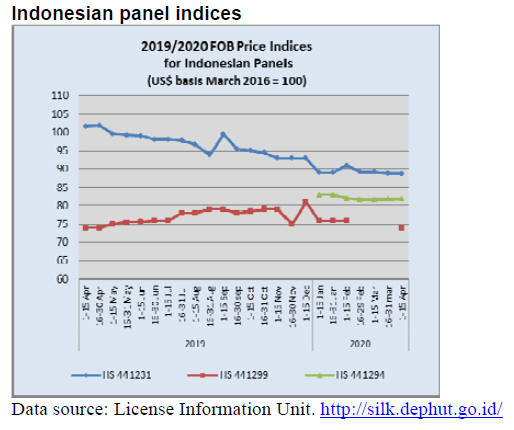
5.
Myanmar
SMEs severely affected by pandemic
According to exporters, some of planned shipments of
wood products have been postponed by buyers in India,
the EU and the US but, as of mid-April, analysts report
there have been no mill closures as a result of the
pandemic but work has stopped for the Myanmar New
Year holidays.
The Myanma Timber Enterprise (MTE) postponed the
teak and other hardwood tenders sales in March and the
tender sale for April has been postponed because of the
Myanmar New Year Holiday.
Analysts say SMEs will be severely affected as they rarely
have financial resources to sustain their business through a
long period of closure. Most manufacturing, agricultural
and tourism industries in Myanmar have been severely
affected and farmers and fruit producers who rely on the
Chinese market have suffered huge losses.
The Myanmar Investment Commission (MIC) says it will
be issuing emergency loans to around 400 small
businesses that have suffered financial losses due to the
pandemic sweeping the world. The loan scheme was
announced in March and the Union of Myanmar
Federation of Chambers of Commerce and Industry
(UMFCCI) began accepting the loan
applications immediately.
In other news, the government has announced that
households in the country will not need to pay for the first
150 units of electricity in April, a measure to lessen the
impact of the pandemic affects.
Survey - Impact of pandemic on timber sector
The ITTO analyst in Myanmar conducted a survey of
timber companies in the second week of April. The
responses to the structures questionnaire are reported
below.
1. Are mills still operating?
Myanmar started the national New Year holiday on 10
April and all factories remained open until 9 April. At that
time the Government urged ‘voluntary home stay’ and
suspended domestic travel. It is not yet clear how
Myanmar will handle the situation when the holiday
period ends on 19 April. The authorities in Yangon, the
commercial hub, have not issued any advice on what
measure will be introduced after the holidays. Most
workers have not returned to their home city because of
the travel restriction.
2. Have workers been laid off?
As of 10 April no workers had been laid off in the timber
industries. But for labour-intensive factories, such as in the
garment industry, there have been lay-offs . According to
the EU ambassador for Myanmar an estimated 25,000
workers from more than 40 factories have been laid off.
According to estimates provided by the EU half of the
700,000 garment workers in the country, most of whom
are female, are at great risk of either being suspended
without pay or losing their jobs permanently.
3. Are laid off workers receiving payments?
There have been some disputes between the government,
employers and trade unions over the need for support.
However, the immediate effects of the pandemic are not
yet clear since factories are closed because of the New
Year holidays.
4. Are companies already receiving government support?
The MIC has announced the availability of interest-free
lions for SMEs and over 400 have applied with 55
companies securing approval. The processing of loan
applications will restart after the New Year holiday.
5. Have orders been cancelled?
In the timber industry some orders have been postponed
but it is hard to get accurate data and facts. Buyers in the
EU have suspended most of garment shipments.
For the timber industries about 50-100 containers are
ready to ship but some are delayed. The value of pending
shipments is said to be between US$4 to 6 million.
6. Are mill stock levels increasing?
For the timber industries stock levels are not increasing
much since mills buy logs in small quantities every month.
For the garment factories stocks are not high since the
main supplier of raw materials (China) has reduced
shipments because of the pandemic.
7. How much time would be required to ramp up
production to pre-crisis levels?
It is estimated that the timber industries will need a
minimum 2 months to raise production to pre-crisi levels.
8. What will be the main challenges in ramping up
production?
The financial stimulus package will be key factor after
the pandemic is controlled.
10. Are containers still being loaded at the port?
In the period up to the beginning of the holidays, port
operations were normal with some signs of congestion.
11. Are containers readily available?
Yes
Workers targeted for support by EU
According to the Centre for Economic and Social
Development (CESD), a Yangon-based think tank, around
40% of Myanmar’s factories, mainly garment factories,
have been severely disrupted by the pandemic putting at
risk the livelihood of thousand of workers, mainly women.
It is estimated that one-third of the factories closed depend
on exports to the EU.
The Myanmar media has reported that European Union
will provide 5 million euros to establish an emergency
fund to support female workers in Myanmar’s garment
sector who have lost their jobs.
See:
https://eurocham-myanmar.org/post/542/European-Unionto-Myanmar-announces-emergency-cash-fund-for-garmentworkers
The EU Ambassador to Myanmar has been reported as
saying over 25,000 workers in more than 40 factories have
been laid off as the garment industry tries to cope with the
devastating financial impact of the pandemic.
European Chamber of Commerce survey of companies
There are many European companies in Myanmar and
they were recently surveyed by the European Chamber of
Commerce in Myanmar to assess their views on the likely
economic impact of the pandemic. The report of the
survey which is available online says “According to the
respondents, more than 60% claim they are already either
significantly or moderately affected; with a forecasted loss
of revenue averaging from 30% to above 50%, small and
medium companies would be the most impacted and
automotive, FMCG, retail and manufacturing are sectors at
the frontline.
While 34% of the respondents answered that the recovery
from the impacts of COVID 19 will depend on how the
supply chain across all industries will react, another 51%
of the respondents estimate a recovery within 6 months.”
See:
https://eurocham-myanmar.org/post/538/EuroCham-Myanmar-survey-results-on-COVID-19-economic-impact
More banks approved
The Myanmar Times has reported that operating licenses
have been granted to seven Asian banks bringing to 20 the
number of foreign banks operating in the country. ). There
are 13 foreign financial institutions currently allowed to
operate in the country.
For details see:
https://www.mmtimes.com/news/myanmar-opens-seven-moreasian-banks.html
Eucalyptus and acacia plantations planned
The Myanmar Investment Commission (MIC) has issued a
joint venture investment permit to Habras-MZZ Plantation
Myanmar Co. Ltd. for establishment of Eucalyptus and
Acacia plantataions to produce wood chips. The
plantations wll be in the Sinma Reserve Forest, Pathein
District, Ayeyarwady Region. The announcement did not
mention the capital and the plantation area.
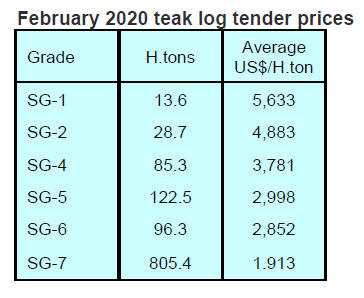
6. INDIA
Shipment update
Indian ports are closed to both imports and exports.
Packed export containers cannot move as the receiving
end ports are closed in most cases. There are import
containers waiting to be discharged but as workers cannot
travel discharging is held up. Until restrictions are lifted
nothing can move. In some cases the shipping companies
are waiving demurrage charges.
Veneer prices edge down
The official Wholesale Price Index for ‘All Commodities’
(Base: 2011-12=100) for February 2020 declined to 122.2
from 122.9 from the previous month.
The index for the group 'Manufactures of Wood and of
Products of Wood and Cork' declined by 0.3% to 132.7
from 133.1 for the previous month due to lower prices for
plywood/blockboard (3%), composite panels (2%).
However, the price of veneer sheets, wooden box/crates
and some other processed products inched higher.
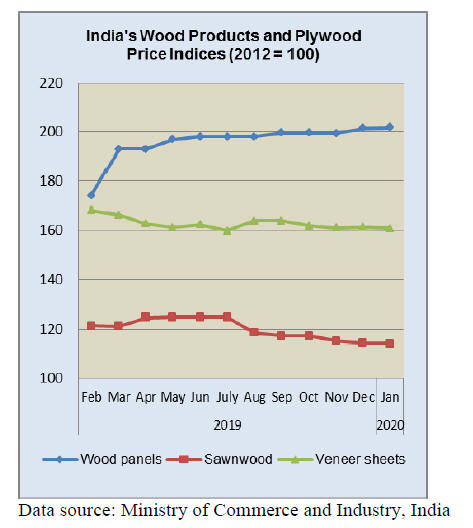
The press release from the Ministry of Commerce and
Industry
can be found at:
https://eaindustry.nic.in/pdf_files/cmonthly.pdf
Furniture imports may face restrictions
The government is considering restrictions on imports of
furniture to help protect domestic manufacturers and
reduce imports of non-essential items. In 2018-19 India's
furniture imports amounted to US$603 mil. with over half
coming from China.
The Department for Promotion of Industry and Internal
Trade has suggested to its commerce counterpart to put the
restrictions. Putting a product in restricted category means
an importer will require a license for the inbound
shipment.
China supply shock as shutdown extends
The shutdown of Chinese companies over the past month
has disrupted shipments to India but many importers had
already stocked up knowing Chinese factories will close
for the Lunar holiday but they did not anticipate the virus
lockdown.
Indian importers say that, despite some factories in China
being back at work, others have deferred re-opening and
this has reduced the flow of imports not only of furniture
but also of panel products used by Indian manufacturers.
As a result of the disrupted supply chain of products from
China retailers turned to domestic manufacturers only to
find that they too cannot work due to the Indian lockdown.
Plantation teak
As a result of the current pandemic business transactions
have come to a standstill. Even if trade was ongoing the
staggering currency fluctuations with Indian Rupee around
Rs76 to a US dollar would challenge importers. Until
currencies stabilise no importer would dare conduct
business.
Brazil and Ghana continue to offering relatively high girth
logs but Indian importers are waiting for exchange rates to
stabilise as exporter prices are in US dollars. It has been
reported that Colombia has offered sawn teak sizes
(inches) 3x3,3x4 and 4x4.for US$440 CNF, Indian ports.
C&F rates at Indian ports from various other sources
continue within the same range as given earlier.
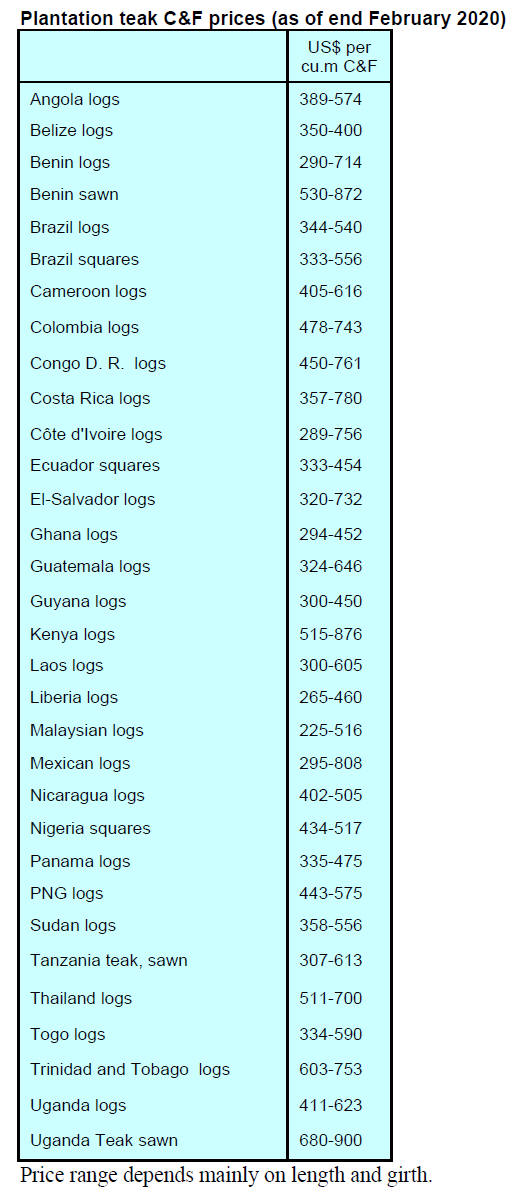
Locally sawn hardwood prices
Prices reported at the end of March are shown below. As
all trade is under lockdown no contracts are in play but
analysts suggest prices will have to rise if the rupee/dollar
exchange rate continues at the current level.
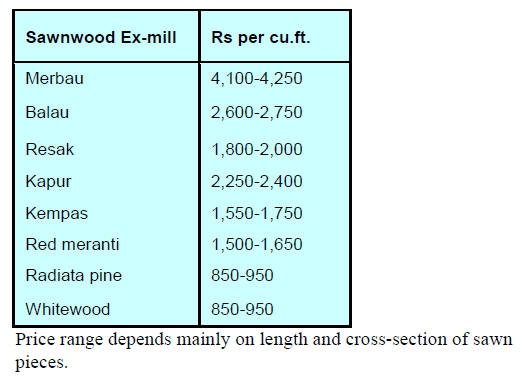
Myanmar teak prices
As all work has stopped in India there is no domestic
demand for Myanmar teak at present.
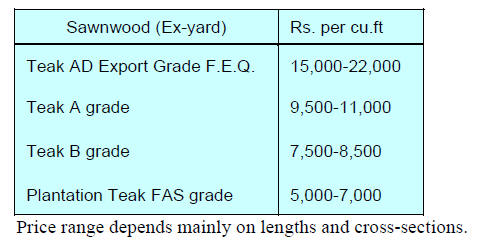
Sawn hardwood prices
Prices reported at the end of March are shown for
reference. There are no sales at present.
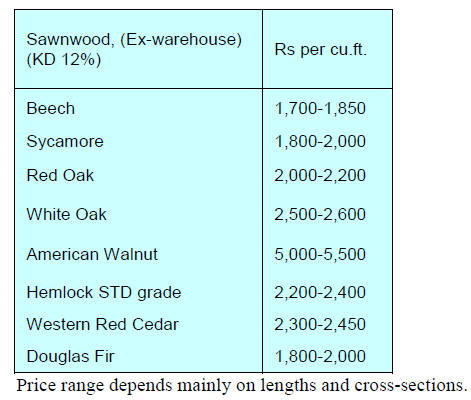
Plywood
Markets are closed due to Lock out. Factories are closed
and the workers have returned to their home states.
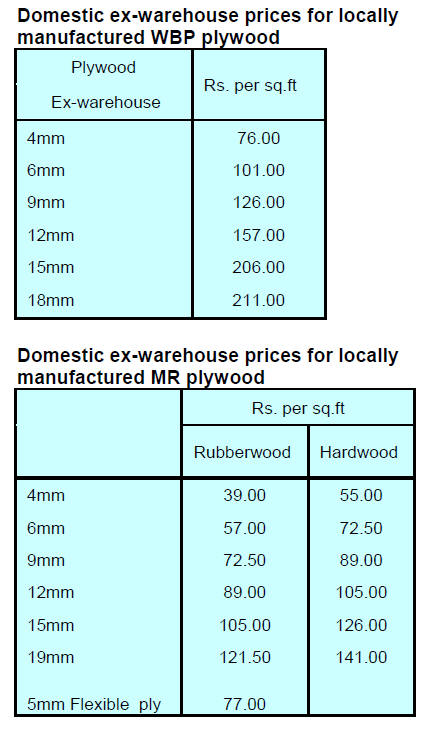
7.
VIETNAM
Vietnamese industry - growth disrupted
In the recent decade, based on 2 key competitive
advantages, including cheap labour (average monthly
wage of US$300) and an abundant wood supply (3 million
ha. of fast growing acacia plantation and 1 million ha. of
rubberwood., Vietnam’s wood and wood product
(W&WP) exports have consistently grown at over 10%
annually. This growth was maintained during the first two
and half months of 2020 when W&WP exports earned
US$2.047 billion, a year on year growth of 18%.
With the COVID-19 pandemic spreading in the US
(market for nearly 50% of W&WP shipped from
Vietnam), Japan (13%), China (12%), EU (10%), South
Korea (10%) the well-developed supply-demand chain has
been disrupted.
Survey - Impact of pandemic on timber sector
A quick survey conducted recently by VIFOREST and
local associations including HAWA, BIFA, FPA Binh
Dinh Associations with 124 enterprises shows the severe
impacts of the pandemic on Vietnamese wood industry.
Huge financial losses by enterprises
Responding to the questionnaire circulated by VIFOREST
and its associates, 76% of enterprises state that they are
facing pandemic damage and the initial loss is estimated at
VND3,066 trillion (around US$130 million); 24% of the
surveyed enterprises say that they have not identified
damage.
Most enterprises have reduced production, some have
to closed their factories
Over half (51%) of the respondents say that they had to
reduce production; 35% of enterprises assume that their
business can be maintained for some while, but suspension
may not be avoided in coming days; only 7% of
enterprises remain operational.
The situation, however, may turn worst at any time
because the entire industry live on the orders left from
2019, and no new ones have made in 2020.
The army of unemployed/unwaged workers is massive
The quick survey shows that about 45% of the labour
force employed in the wood processing industries have
lost their jobs due to the pandemic. Out of the 124
interviewed enterprises, 105 respondents informed that
before the virus outbreak they employed 47,506 workers
but they have now laid off 21,410.
The burden of loan repayments, social insurance
payments, taxes and other costs is acute
83 respondents complained that they are unable to pay
VND 178.6 billion of social insurance for their employees
(VND2.15 billion each enterprise on average);
50 enterprises responded that they cannot manage to cover
VND174.6 billion of VAT (equivalent to VND3.49 billion
per enterprise);
The income tax 64 enterprises have to pay is amounted to
VND212.9 billion (VND3.1 billion each) is beyond their
financial capacity at this crisis time; 61 enterprises tend
unable to handle VND44 billion of land rental fees (in
average, VND0.7 billion each enterprise has to pay);
The accumulated outstanding loans that 96 enterprises have
to settle amounts to VND 6,207 trillion (VND64.7 billion per
enterprise).
Emergency supports/rescue interventions by the
Government needed
The emergency support/rescue intervention sort by the
surveyed enterprises can be grouped á follows:
Financial intervention to support workers who lose their
jobs:
78 enterprises asked the Government to provide financial
support for the minimum wage (VND3.6 million per worker
per month) for workers who temporarily lost their job.
The Government is considering paying half of this minimum
wage, while the employers can get access to low/non interest
loan to cover the rest.
Immunity/postponement of taxes and fees applicable for
enterprises:
31% of surveyed enterprises have requested the Government to
exempt 100% of taxes, including corporate income tax, VAT,
as well as social insurance and land rental fees; 31% have
proposed to reduce 50% of these taxes and fees; 15% have
requested to reduce current payment level to 40% or less.
Extending the term for outstanding loan repayment:
30% of the surveyed enterprises tend to favour commercial
banks extending the term for loan repayment for an additional
6 month period; 29% prefer a 9 month extension; 13% ask for a
12 month extended; 6% for an extra 5 month period.
Reduction of loan interest rates applied by currently
commercial banks:
52% of respondents proposed lowering annual loan interest
rates down to 2-5%; 11% wish to have 2% rate; 5% can afford
the rate varying 5.1-7.0%.
Other emergency requests:
Struggling to survive and the hoping to overcome the pandemic
in the near future, apart from the above-mentioned requests,
enterprises also indicate specific considerations to be taken by
relevant authorities at central and local levels, namely:
 Management boards responsible for running
Management boards responsible for running
industrial parks to offer one year exemption of
maintenance payment;
 Leaders of Binh Duong Province to issue “red
Leaders of Binh Duong Province to issue “red
book” (land use certificate) so that enterprises
operating in provincial industrial parks could
leave necessary collateral for bank loans;
 Extension the term for outstanding loan
Extension the term for outstanding loan
repayment without lowering the enterprise credit
rating;
 Temporarily stop charging VAT on imported
Temporarily stop charging VAT on imported
goods;
 Reduce the charge for goods
uploading/unloading
Reduce the charge for goods
uploading/unloading
at ports;
 Temporary support livelihood of those workers
Temporary support livelihood of those workers
who are not eligible to get unemployment
insurance, and, thereby, enable suffering
enterprises to keep workers for post-pandemic
restoration of production;
 Provision of preferential commercial loans
Provision of preferential commercial loans
needed for enterprises to maintain and improve
production capacity and get readiness for
business development while the pandemic gets
over;
 Support to maintain the limit of short-term
loans
Support to maintain the limit of short-term
loans
to survive until the time when production and
business get re-normalised;
 Stop collecting trade-union fee until the end
of
Stop collecting trade-union fee until the end
of
the pandemic;
 No regular inspections on enterprise taxation
and
No regular inspections on enterprise taxation
and
other performances during the remained months
of 2020;
 Allow enterprises to negotiate with their
Allow enterprises to negotiate with their
employees to fix non-employed wage/suspended
production subsidies;
Conclusion
This survey of 124 wood enterprises illustrates that the
COVID-19 pandemic is having a devastating impact on
the timber industry sector of Vietnam. Even though the
situation is changing fast and the worst picture be yet to
come the export-biased wood industry of Vietnam is
already facing a crisis.
The package of emergency support proposed by the
government to adjust fiscal policies, social insurances,
credit support, tax and fee exemption or reduction etc. is
insufficient and inadequate to protect the industry from the
impact of this pandemic. In all likelihood Vietnam not
see growth of W&WP exports this year.
Source: Data/information collected from 124 enterprises through
a quick survey and analysed by VIFOREST in association with
HAWA, BIFA, FPA Binh Dinh and the Forest Trends team.
8. BRAZIL
Survey - Impact of pandemic on timber
sector
1. Are logging operations still working?
Yes, no significant change
2. Are mills/factories still working?
Depends on the segment. Pulp and paper 100%, solid
wood industry depends on the State or municipality
decisions. Most states have no significant restrictions but
some municipalites have stopped industrial operations.
Very had to estimate a percentage but is small.
3. Have workers been laid off?
The government has proposed legal provisions to mitigate
the impact. Options are anticipated, holidays, leave,
reduction of working hours with reduced salaries,
suspension of contracts.
Generally, so far, few companies have laid off workers but
the virus problem is just starting and will get worse in the
next few weeks.
4. Are laid off workers receiving payment?
Government assistance includes a small amount of money
over the next 3 months for unemployed persons and a
contribution to complement part of the salaries in case of
suspension or suspension of contract.
5. Are timber companies receiving government support?
Government support to companies includes a package of
credit lines. In addition payment of taxes were postponed.
6. Are companies still fulfilling orders placed pre-crisis?
Some domestic and international orders have been
cancelled. Force Majeure has been invoked. This is
expected to increase.
7. Are domestic logistics for the timber industry
functioning?
There are no logistical problems
8. What will be the main challenges in ramping up
production?
The problem is demand, there will be no problem in
ramping up production at the end of the crisis.
9. Please estimate how long it would take for production
to get back to pre-Covid Crisis levels?
Production will begin immediately the crisis is over.
10. What is your estimate (in US$) of national total lost
sales in Q1 2020 compared to Q1 2019?
For 202 it is estimated that a reduction of between 40-
50%. Most reduction expected in the next 6-9 months but
effect will be felt into 2021.
11. Comments, suggestions
All will depend on the recovery of the economies of the
importer countries. In the case of Brazil the domestic
market is quite important and the local economy is
expected to be affected in 2020 and into 2021. Brazil’s
exports of pulp and paper areis not expected to be
significantly affected. Markets for solid wood products are
highly concentrated in China USA and some EU member
states.
Exports of solid wood products to China (and other Asian
countries) will also decline but will be less affected. On
the other hand, exports to the USA and EU will decline
sharply in 2020 and into 2021.
Impact of and response to pandemic
The economic impact of the corona virus outbreak and the
measures adopted to try and slow its spread are having a
huge impact. Brazilian manufacturing activity in March
declined at the fastest rate in three years and the real sank
to a record low of 5.27 to the US dollar.
The impact on SMEs, especially those in the informal
sector, is the most critical because the
lockdown restrictions and containment measures mean
most workers in this sector are now without an income.
Paulo Guedes, The Minister of the Economy said the
government will spend about 98 billion reais (US$18
billion) to help the over 50 million informal workers
affected by nationwide lockdowns, part of an overall 800
billion reais government support package.
Other enterprises will benefit from a variety of non-tax
measures relating to employment and public health. The
government also introduced measures relating to tax
measures.
Tax and international trade facilitation measures
announced
There have been other decisions on measures for the
protection of the economy and maintenance of jobs and
incomes and the forestry and timber sectors will be offered
support. Some of the decision announced by the Ministry
of Economy for manufacturers include:
 Zero IOF rates on credit operations for 90
days
Zero IOF rates on credit operations for 90
days
(Zero IOF is a macroeconomic concept
describing conditions with a very low nominal
interest rate,)
 Extension of the deadline for filling
individual
Extension of the deadline for filling
individual
income tax return to June 30 (usually it is end of
April)
 Postponement of the payment of federal taxes
Postponement of the payment of federal taxes
(PIS, COFINS and Employer's Social Security
Contribution) to August-October that would be
paid between April and May.
In addition, the Business Coalition for Trade Facilitation
and Barriers has suggested additional measures would be
essential:
 Adjustment of the Reintegra (Special Regime
for
Adjustment of the Reintegra (Special Regime
for
Reintegrating Tax Values for Exporting
Companies) rate to 3%
 Extension of the deadline of the Drawback
Extension of the deadline of the Drawback
concession acts due in 2020
 Swiftness in the issuance and extension of
import
Swiftness in the issuance and extension of
import
licenses for 90 days
 Postponement of deadlines for payment of
Postponement of deadlines for payment of
customs charges and fees
 Total exemption of the physical presentation
of
Total exemption of the physical presentation
of
receipts for cargo clearance
Exports disrupted
There are great uncertainties in the how domestic and
international demand will evolve in the short-term and in
the longer term if the pandemic is not quickly controlled.
With the closure of borders many companies have export
containers stopped at the ports. Sindusmobil (Union of
Construction and Furniture Industries of São Bento do Su)
has reported that in the municipality of São Bento do Sul,
the major furniture manufacturing and export cluster, the
situation is uncertain as companies cannot plan as they do
not know when the situation will get back to normal.
In Arapongas municipality, which ranks third among the
largest furniture exporters in the country, the situation is
no different. Sima (Arapongas Furniture Industries Union)
reports that there are companies that produce primarily for
export and have lost this business.
For Sindmóveis (Union of Furniture Industries of Bento
Gonçalves), the supply and demand shocks caused by the
corona virus will significantly impact furniture exports and
the entire Brazilian industry. The extent of and likely
outcome of this crisis is still too early to assess.
Furniture industry back to work in Bento Gonçalves
On a brighter note the Bento Gonçalves industries
resumed operations on 6 April following Municipal
Decree authorisation. Sindmóveis provided guidance to
manufacturing companies in the furniture sector on how to
adopt other practices in order to prevent contagion in the
workplace, recommending working-from-home where
possible and adoption of flexible work policyies such as
phased work schedules.
Sindmóveis emphasised that manufacturing companies
have avoided layoffs, opting for alternatives approaches
but the recent moves are expected to limit unemployment
from now but a decline in production is inevitable and job
losses very possible.
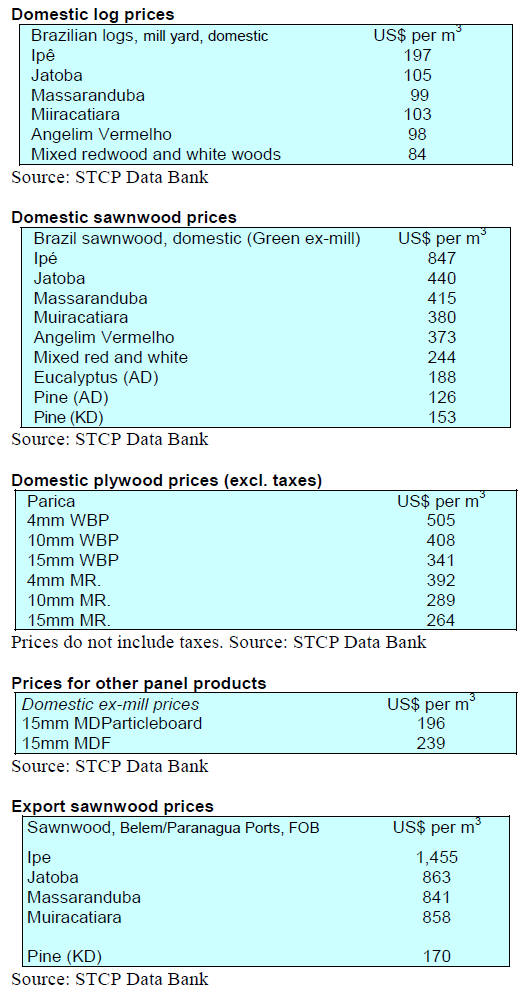
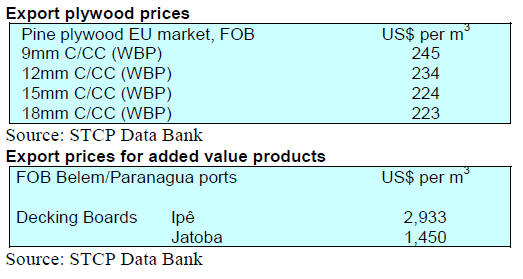
9. PERU
Forestry paralysed by lockdown
A nationwide lockdown in Peru was announced on 16
March with some of the region’s most stringent
containment measures. Peru introduced gender-based
restrictions. Women were permitted out on Tuesdays,
Thursdays and Saturdays. Men permitted out Mondays,
Wednesdays and Fridays. Everyone had to stay home on
Sunday.
All activities in the forestry and timber sectors have been
stopped until further notice and recreational activities,
college classes, universities and institutes, cinemas,
theaters, as well as productive activities have been closed
except for priority or strategic activities such as food
production, health services and banking.
The International Monetary Fund forecast that this
decision will drive the country into a recession with
growth set to contract 4.5% this year.
The tough lockdown has slowed the rate of spread of
infection and in the number of people requiring
hospitalisation which is being interpreted as the country is
on the right track and can plan for a gradual reopening of
the economy next month. President Martin Vizcarra
suggested some restrictions could be eased in May despite
the rise in infected people identified in a mass testing.
Vizcarra announced a huge stimulus package including
cash handouts and cheap business loans one of the largest
packages yet to be announced in South America.
2019 export performance
The Exporters Association (ADEX) has reported that 2019
wood product exports earned US$124.9 million FOB. This
is almost the same as export earnings in 2018. Semimanufactured
product exports accounted for around 65%
of wood product exports followed by sawnwood (22%)
where there was an 18% increase year on year. Exports of
builders’ woodwork dropped over 30% and exports of
veneer, plywood as well as furniture and parts were lower
than in 2018.
Of the US$124.9 million exported in 2019 China
continued to be the main market, accounting for a 40%
share of export values but this was down 4% year on year.
Mexico was the second largest export markets accounting
for 11% of exports. Here export earnings were up almost
5%. The other major markets were France and the US
which each accounted for around 9% of export earnings in
2019.
Sawnwood exports in 2019 earned US$27.4 million
significantly up on 2018. The main destination for
sawnwood was the Dominican Republic (33% of all
sawnwod exports). Sawnwood exports to the Dominican
Republic increased over 25% in 2019 from a year earlier.
The other markets were Mexico (25%) and China (24%).
Loreto region achieves highest forest zoning
nationwide
Peru has the challenge of zoning 125 million ha.
corresponding to 97% of its territory and progress has
been made with the approval of the first stage of forest
zoning in Loreto as a result of cooperation between the
Regional Government of Loreto and the National Forest
and Wildlife Service (Serfor). Loreto is now the region
with the largest area of forest zoned at 15.9 million
hectares.
With an area of 36.9 million hectares, Loreto has the
largest área of tropical rain forest and with the approval of
its forest zoning has taken a big step to credible
sustainable management of its natural resources.
